五年级英语秋季培优第17讲 How nice the flowers are
冀教版五年级英语下册 Lesson 17 教学课件
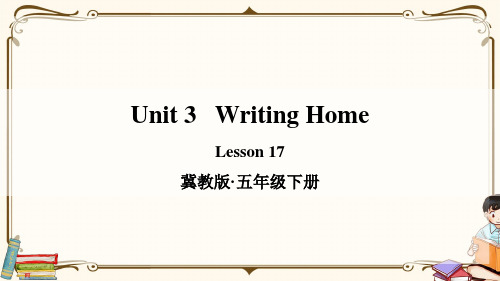
Dear Danny, It’s cold and snowy in Canada now. I’m wearing my new winter coat. Are there many famous places in Beijing? Remember to take some pictures. I’ll be happy to see you again. Say hi to your friends for me. Your friend, Steven
Read. Tick or cross. √□1. This is an email from Steven. ×□2. This email is to Jenny. √□3. Steven is Danny’s friend. ×□4. It’s sunny in Canada. ×□5. Steven is in Beijing.
Language points
①How’s the weather in Canada? 加拿大的天气怎样啊? 这是一个询问某地天气的句子。一般情况下,询问天气
情况的句型有两种: How’s the weather in +地点? What’s the weather like in +地点? 这两个句型的答语一般是:It’s +天气形容词(sunny,
Thank you. We’ll miss you, too.
Don’t forget to write to us.
Language points
① Tomorrow you’ll go back to Canada. 明天你将要回加拿大了。 you’ll 是you will 的缩写形式,意为“你将……”。will
北师版小学英语五年级上册unit 5 lesson 17教案

北京版小学英语五年级英语学习基础很重要,记住单词,默写单词,不要粗心大意。
北京版小学英语和你一起共同进步学业有成!Unit 5 Where are you from? Lesson17教案LESSON 17 第1课时一、教学内容:(一)主题课文:Guoguo: Mike, can you tell me more about Canada?Mike: Yes. It’s in North America. Ottawa is the capital. It’s in the east of the country. But I’m from the west.Guoguo: I know your national flag is very beautiful. There is a red maple leaf in the center of it.Mike: Yes. We Canadians speak both English and French.(二)词汇:四会单词:Canada north but west French both Canadian beautiful very认读单词: Harbin / north Chengdu / west Guangzhou / south(三)功能句型:Can you tell me more about Ottawa?It’s in the east of the country.二、教学目标:(一)知识与技能目标:1. 能正确理解课文内容,朗读课文,程度好的学生可以表演对话。
2. 了解加拿大的首都、所在的位置、国旗、国旗上的图案、及加拿大的语言。
在次基础上,学生能听懂会说表达请求的功能用语,并能在实际情境中中初步学习使用。
Can you tell me more about Ottawa?It’s in the east of the country.1. 能听说读写:north but west both beautiful very , 强化th w cho er u的读音。
人教版五年级下册Lesson 17
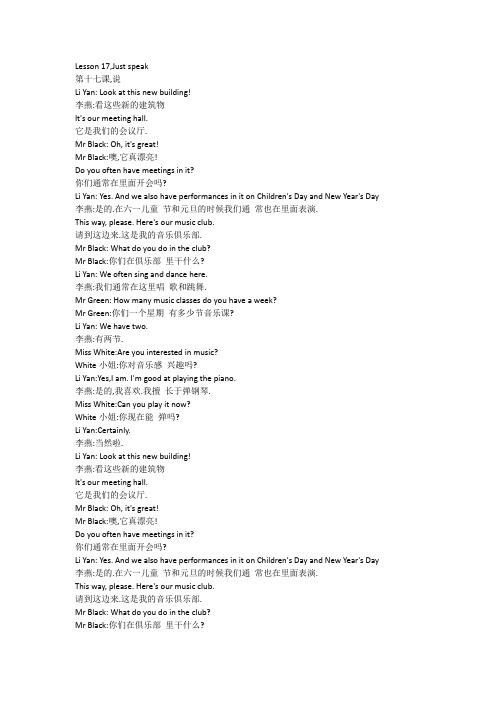
Lesson 17,Just speak第十七课,说Li Yan: Look at this new building!李燕:看这些新的建筑物It's our meeting hall.它是我们的会议厅.Mr Black: Oh, it's great!Mr Black:噢,它真漂亮!Do you often have meetings in it?你们通常在里面开会吗?Li Yan: Yes. And we also have performances in it on Children's Day and New Year's Day 李燕:是的.在六一儿童节和元旦的时候我们通常也在里面表演.This way, please. Here's our music club.请到这边来.这是我的音乐俱乐部.Mr Black: What do you do in the club?Mr Black:你们在俱乐部里干什么?Li Yan: We often sing and dance here.李燕:我们通常在这里唱歌和跳舞.Mr Green: How many music classes do you have a week?Mr Green:你们一个星期有多少节音乐课?Li Yan: We have two.李燕:有两节.Miss White:Are you interested in music?White小姐:你对音乐感兴趣吗?Li Yan:Yes,I am. I'm good at playing the piano.李燕:是的,我喜欢.我擅长于弹钢琴.Miss White:Can you play it now?White小姐:你现在能弹吗?Li Yan:Certainly.李燕:当然啦.Li Yan: Look at this new building!李燕:看这些新的建筑物It's our meeting hall.它是我们的会议厅.Mr Black: Oh, it's great!Mr Black:噢,它真漂亮!Do you often have meetings in it?你们通常在里面开会吗?Li Yan: Yes. And we also have performances in it on Children's Day and New Year's Day 李燕:是的.在六一儿童节和元旦的时候我们通常也在里面表演.This way, please. Here's our music club.请到这边来.这是我的音乐俱乐部.Mr Black: What do you do in the club?Mr Black:你们在俱乐部里干什么?Li Yan: We often sing and dance here.李燕:我们通常在这里唱歌和跳舞.Mr Green: How many music classes do you have a week? Mr Green:你们一个星期有多少节音乐课?Li Yan: We have two.李燕:有两节.Miss White:Are you interested in music?White小姐:你对音乐感兴趣吗?Li Yan:Yes,I am. I'm good at playing the piano.李燕:是的,我喜欢.我擅长于弹钢琴.Miss White:Can you play it now? Li Yan:Certainly. White小姐:你现在能弹吗? 李燕:当然啦.Lesson 18,1.Just practise第十八课,1.练习How many music classes do you have a week?你们一个星期有多少节音乐课?We have two.我们有两节.What do you do in the music club?你们在音乐俱乐部做些什么?We often sing and dance.我们通常是唱歌和跳舞.music club play the violin listen to music音乐俱乐部弹钢琴听音乐art club paint draw艺术馆绘画画画4.Let's read and chant Uu4.让我们一起读和吟唱The music is for the Duke.音乐是给公爵的。
五年级英语Lesson17Let’sbuypostcards的优

五年级英语Lesson17Let’sbuypostcards的优五年级英语Lesson 17 Let’s buy postcards的优秀教案Lesson Plan( Assignment for Nov. 18th)Aim: Students will be able to identify some foodstuffs and talk about likes of food.Students: Grade 1, from Experimental Primary School attached to BNU.Size of class: 48Time: 40 mins.Language: lunch, beef, chicken, hamburger, candy, etc.---Would you like some…?---Yes, please./ No, thanks. I don’t like…Assumption: The students have learned some words on drinks and foods such bread and cake. They have learned how to response to the question “ Would you like some drinks?”Procedure:1. Warm-up ( Review)How are you?What is the weather today? It’s cold and sunny.Who can tell me what you have learned last time?2. Presentation of new language itemsWe are going to learn how to tell people about your likes.(Take out a bottle of apple juice)What’s this? This is apple juice.I like apple juice.Do you like apple juice?(Ask students to guess the meaning of the sentence pattern. Then do some drills both individually and in chorus.)---Do you like tea? ---No, I don’t. I don’t like ….---Do you like coffee?---Yes, I do.……3. Identifying the foodstuffs(Demonstrate the pictures of food and then stick them one by one on the board)What is this? It’s …….Do you like….?4 Story-telling: A Lunch in the ForestI am going to tell you a story. Then, I will ask your some questions. Listen carefully.(Stick a paper clock on the board and show the time 12 o’clock.)The tiger, the king of the forest, is going to invite some animals to lunch. Can you guess who they are? They are Mr. Giraffe, Mr. Fox, Mr. Cat, Mr. Money, Mr. Mouse, and Mr. Pig. ( Stick pictures of the animals on the board around the foodstuff.) The tiger asks the animals what they would like to eat. “ Mr. Giraffe, would you like some meat?” Mr. Giraffe says, “ No, thanks. I don’t like meat. I like some grapes.” “ Mr. Fox, would you like some meat?” Mr. Fox says, “ Yes, please.Thank you.” Finally, every animal has the food they like. They begin to eat. ( make some facial expression) “ Oh---. It’s good.” They have a good lunch.( Some parts of the story is told with Chinese translation. The teacher is suggested to imitate the voice of the animals in different tones and various facial expression.)5.Questions & Answers ( in Chinese)Would Mr. Giraffe like some meat? What does it say?Would Mr. Fox like some meat? What does it say?……When they begin to eat, what do they say?6. Communicative activities: Role-play ( in pairs)( Ask some pairs of students to come in front and do the role-play)If you invite a friend to lunch, what do you say to the friend? Choose some food form those on the board.7. Homework:Ask students to draw pictures of food they like to eat for lunch to home and take the picture to class next time.教学反思:通过图片介绍了明信片、信和电子邮件,提到了同学学习的兴趣,整节课都精力充分.。
五年级下册英语精通版第17课

五年级下册英语精通版第17课一、单词部分。
1. 重点单词。
- 列出课文中的新单词,例如:如果有关于描述动物(假设课文主题是动物)的单词,像“elephant(大象)”“giraffe(长颈鹿)”等。
- 单词的发音:标注音标,如“elephant [ˈelɪfənt]”。
- 词义解释:简单解释单词的意思,可以举例说明用法,例如“An elephant is a very large animal. It has a long nose.”2. 单词记忆方法。
- 联想记忆:对于“giraffe”,可以联想它长长的脖子,像电线杆一样,帮助记忆单词的形状和意义。
- 读音记忆:根据单词的发音规则来记忆,如“elephant”中“e”发[e],“ph”发[f]等。
二、课文部分。
1. 课文内容概括。
- 简单描述课文的主要情节或者主题。
如果是对话形式的课文,说明对话发生的场景和人物之间的交流内容。
例如:课文是关于动物园之旅,对话发生在两个小朋友之间,他们在讨论看到的动物。
2. 重点句型。
- 找出课文中的重点句型,如“ - What can you see? - I can see a giraffe.”- 句型的用法:解释句型在什么情况下使用,对于上述句型,可以说这是用来询问和回答看到的事物的。
- 句型的拓展:例如将“a giraffe”换成其他动物或者事物,“ - What can you see? - I can see a big tree.”3. 语法点。
- 如果课文中有新的语法知识,如一般现在时的特殊疑问句(像上面的“What can you see?”),解释语法规则。
在这个例子中,“What”是特殊疑问词,“can”是情态动词,后面接动词原形“see”。
三、练习部分。
1. 听力练习。
- 如果有听力相关的练习,可以提供一些听力技巧,如听前先浏览题目,预测可能听到的内容;听时注意关键词等。
- 可以自己编写一些简单的听力练习题目,例如听单词选图片(如果单词是关于动物的,就给出动物的图片让学生选择)。
五年级英语上册17课教案
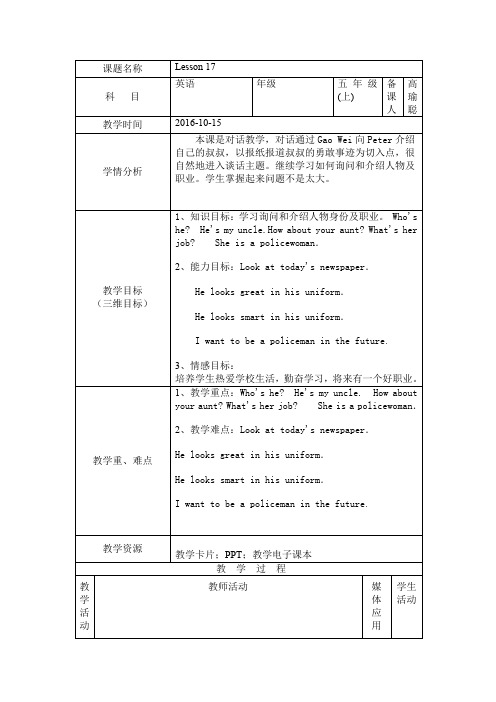
Lesson 17
科目
英语
年级
五年级(上)
备课人
高瑜聪
教学时间
2016-10-15
学情分析
本课是对话教学,对话通过Gao Wei向Peter介绍自己的叔叔,以报纸报道叔叔的勇敢事迹为切入点,很自然地进入谈话主题。继续学习如何询问和介绍人物及职业。学生掌握起来问题不是太大。
教学目标
(三维目标)
1、Say:Let`s go on talking about jobs.Play the e-text and let the students watch and observe the picture,ask;
1)what`s this?
2)Who's the man in today's newspaper?
教学过程
教学活动
Step1、Warming-up / Revision
1)Show the PPT and let the students say the words of jobs quickly.
2)Free talk
What does he/she do? What do they do?
Step2|、Presentation)
Homework:Finish the exercises in woo the e-text and answer.
Who's he?He's a fireman.
He's my uncle.
How about your aunt?
What's his job?She is a policewoman.
2、教学难点:Look at today's newspaper.
小学英语《Unit17 What season do you like best》省级名师优质课教案比赛获奖教案示范课教案公开课教案
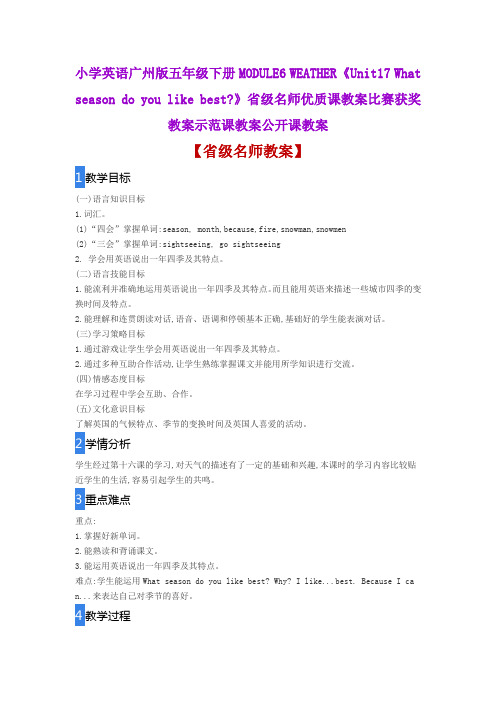
小学英语广州版五年级下册MODULE6 WEATHER《Unit17 What season do you like best?》省级名师优质课教案比赛获奖教案示范课教案公开课教案【省级名师教案】1教学目标(一)语言知识目标1.词汇。
(1)“四会”掌握单词:season, month,because,fire,snowman,snowmen(2)“三会”掌握单词:sightseeing, go sightseeing2. 学会用英语说出一年四季及其特点。
(二)语言技能目标1.能流利并准确地运用英语说出一年四季及其特点。
而且能用英语来描述一些城市四季的变换时间及特点。
2.能理解和连贯朗读对话,语音、语调和停顿基本正确,基础好的学生能表演对话。
(三)学习策略目标1.通过游戏让学生学会用英语说出一年四季及其特点。
2.通过多种互助合作活动,让学生熟练掌握课文并能用所学知识进行交流。
(四)情感态度目标在学习过程中学会互助、合作。
(五)文化意识目标了解英国的气候特点、季节的变换时间及英国人喜爱的活动。
2学情分析学生经过第十六课的学习,对天气的描述有了一定的基础和兴趣,本课时的学习内容比较贴近学生的生活,容易引起学生的共鸣。
3重点难点重点:1.掌握好新单词。
2.能熟读和背诵课文。
3.能运用英语说出一年四季及其特点。
难点:学生能运用What season do you like best? Why? I like...best. Because I ca n...来表达自己对季节的喜好。
4教学过程。
五年级英语上册17-21课教案
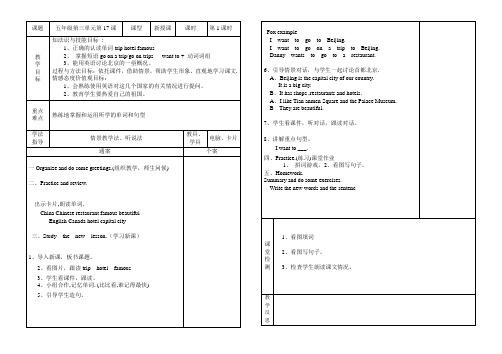
4、创设情景,让学生扮做不同角色合作进行对话.
5、小组练习,模仿对话。(课文内容)
四、song
learn to sing the song.
五、Practice.
教师巡回指导。
六、Summary and do some exercises.
Fox example
from Shijiazhang toBeijing
fromBeijingtoGuangzhou
学生看课件,跟读对话。
学生两人一组练习,模仿对话。
4、创设情景,教师扮做李明的妈妈与学生合作进行对话.
MayI……..? Yes, you may.
No, you may not
四、Practice.(练习)
It is a big city.
B、It has shops ,restaurants and hotels.
A、I like Tian anmen Square and the Palace Museum.
B They are beautiful.
7、学生看课件,听对话,跟读对话。
8、讲解重点句型。
4、引导学生看课件,学习对话。(课文内容)
看课件,听对话,跟读对话,想对话的大概意思。
引导学生两人一组,进行对话练习。
A、How far is it from ___to ___?
B、About ___kilometres.
四、Practice.(练习)
与学生一起进行情景演示教师巡回指导。
五、Homework.
1、熟练地认读下列单词:about
2、认识100到10000的数字
小学英语五年级【冀教版】上册教学课件-【Lesson 17 】
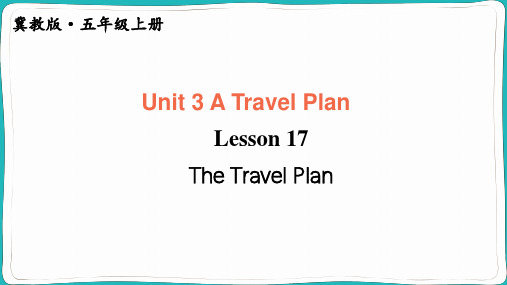
I will go to Wuhan.
On Tuesday
I will go to Yellow Crane Tower.
On Wednesday I will go to Wuhan University.
On Thursday On Friday
I will go to the East Lake. I will go to Hubei Provincial Museum.
I will go home on Saturday.
Listen aloud along the tape
igh
y
light
by
night
fly
i time bike
Try to read.
fight
sky
bite
字母(组合)igh/y/i在 单词中的发音
是双元音,发音时声带振动。 由 音滑向 音,前重后轻, 口形随之变化。
冀教版·五年级上册
Unit 3 A Travel Plan Lesson 17
The Travel Plan
A plane is fast. A bus is slow. Let’s take a plane. That is how I want to go! A plane is not cheap. A train is just right! We can take a train. On our trip to Beijing!
2 be going to表示根据主观判断将来肯 定会发生的事情;
will则表示将来自然发生的事情。
例句
他打算在聚会上唱一首歌。 He is going to sing a song at the party. 明年我就12岁了。 I will be 12 years old next year.
英语五年级下册第17课

英语五年级下册第17课Lesson 17 of the fifth grade English textbook covers a variety of topics, including food, transport, and weather. In this lesson, students will learn new vocabulary related to these topics and practice using it in sentences. The lesson also includes listening and reading activities to help students improve their comprehension skills.One of the main focuses of this lesson is on food. Students will learn the names of different types of food, such as fruits, vegetables, and grains. They will also learn how to talk about their favorite foods and describe them using adjectives. For example, they might say "I like juicy apples" or "I love crunchy carrots."In addition to food, students will also learn vocabulary related to transport. This includes different modes of transportation, such as cars, buses, trains, and planes. They will learn how to talk about their daily commute to school or work and how to give directions using prepositions like "next to," "in front of," and "behind."Finally, the lesson also covers the topic of weather. Students will learn the names of different types of weather conditions,such as sunny, rainy, cloudy, and windy. They will practice describing the weather using adjectives and learn how to ask and answer questions about the weather forecast.Overall, Lesson 17 is a comprehensive and engaging lesson that covers a range of important topics in English. By the end of the lesson, students should feel more comfortable using the new vocabulary and grammar structures they have learned.。
人教版精通英语五下17课知识点
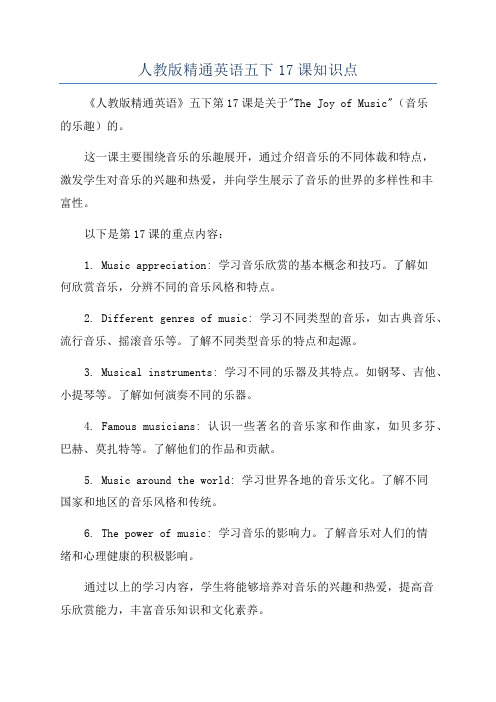
人教版精通英语五下17课知识点
《人教版精通英语》五下第17课是关于"The Joy of Music"(音乐
的乐趣)的。
这一课主要围绕音乐的乐趣展开,通过介绍音乐的不同体裁和特点,
激发学生对音乐的兴趣和热爱,并向学生展示了音乐的世界的多样性和丰
富性。
以下是第17课的重点内容:
1. Music appreciation: 学习音乐欣赏的基本概念和技巧。
了解如
何欣赏音乐,分辨不同的音乐风格和特点。
2. Different genres of music: 学习不同类型的音乐,如古典音乐、流行音乐、摇滚音乐等。
了解不同类型音乐的特点和起源。
3. Musical instruments: 学习不同的乐器及其特点。
如钢琴、吉他、小提琴等。
了解如何演奏不同的乐器。
4. Famous musicians: 认识一些著名的音乐家和作曲家,如贝多芬、巴赫、莫扎特等。
了解他们的作品和贡献。
5. Music around the world: 学习世界各地的音乐文化。
了解不同
国家和地区的音乐风格和传统。
6. The power of music: 学习音乐的影响力。
了解音乐对人们的情
绪和心理健康的积极影响。
通过以上的学习内容,学生将能够培养对音乐的兴趣和热爱,提高音
乐欣赏能力,丰富音乐知识和文化素养。
为了更好地掌握这些知识点,学生可以进行以下几方面的学习和实践:。
五年级上册英语第十七课

五年级上册英语第十七课Five Grade English Lesson 17In Lesson 17 of the fifth grade English textbook, students will learn about various topics related to daily routines and activities. This lesson provides an opportunity for students to expand their vocabulary and practice using present simple tense. Let's dive into the details!1. IntroductionThe lesson begins with a brief introduction to the topic of daily routines. It emphasizes the importance of establishing a routine and the impact it can have on a person's life. Students are encouraged to reflect on their own daily routines and share with the class.2. VocabularyNext, students are introduced to new vocabulary words related to daily activities. These words include "wake up," "brush teeth," "have breakfast," "go to school," "have lunch," "do homework," "have dinner," and "go to bed." The teacher explains the meaning of each word and provides examples in sentences to help students understand their usage.3. GrammarAfter learning the vocabulary, students move on to understanding the present simple tense in English. The teacher explains that this tense is used to talk about habitual actions and general truths. Students are given examples and encouraged to form their own sentences using the present simple tense.4. Listening and SpeakingThe lesson incorporates listening and speaking exercises to enhance students' language skills. Students listen to a recording of a daily routine and then answer questions about it. This exercise helps them develop their listening comprehension and speaking ability as they share their answers with their classmates.5. Reading ComprehensionFollowing the listening and speaking activities, students proceed to a reading comprehension exercise. They read a short passage about a boy named Jack and his daily routine. The passage contains the vocabulary words and sentences in the present simple tense that they have learned. Students answer questions based on the passage to gauge their understanding of the text.6. WritingTo reinforce their understanding of the lesson, students are given a writing task. They are asked to write a paragraph about their own daily routines, using the vocabulary and grammar structures learned in the lesson. This activity encourages students to think critically and apply what they have learned to real-life situations.7. Consolidation activitiesFinally, the lesson concludes with various consolidation activities to review the vocabulary, grammar, listening, speaking, reading, and writing aspects of the lesson. These activities can be done individually, in pairs, oras a group, promoting active participation and engagement within the classroom.In conclusion, lesson 17 of the fifth-grade English textbook focuses on daily routines and activities. Through the introduction of new vocabulary, grammar structures, listening, speaking, reading, and writing exercises, students are provided with a comprehensive learning experience. By the end of this lesson, students should have a better understanding of daily routines and be able to express themselves confidently using the present simple tense.。
冀教版英语五年级下册17课汉语意思

冀教版英语五年级下册17课汉语意思全文共6篇示例,供读者参考篇1Lesson 17: The Meaning of Chinese WordsHi everyone! Today, I'm going to tell you about the meaning of Chinese words. Have you ever wondered what those funny looking characters mean? Well, wonder no more because I'm here to explain it to you!Did you know that Chinese characters are made up of different parts that give clues to their meanings? It's like a puzzle, and once you know the pieces, you can figure out what the whole word means.For example, let's take the word "" (jiā), which means "home" in Chinese. It's made up of the characters for "roof" and "pig." So, if you think about it, a "home" is like a roof over your head, and maybe even a pig in the backyard!Another word is "" (huǒchē), which means "train" in Chinese. It's made up of the characters for "fire" and "carriage." So, a "train" is like a carriage that runs on fire (not real fire, of course!).One more example is "" (diànshì), which means "television" in Chinese. It's made up of the characters for "electricity" and "vision." So, a "television" is like a box that shows you things using electricity.See? It's like putting together a puzzle to figure out what the Chinese words mean. It's pretty cool, right?So, next time you see a Chinese character, don't be afraid to try and figure out what it means by looking at the different parts. You might just surprise yourself with how much you can learn!That's all for today, folks! Stay curious and keep on learning. See you next time!篇2Title: Lesson 17 of the Fifth Grade Book of Jibei Edition - "Chinese Meanings"Hey everyone! Today let's talk about Lesson 17 of the fifth grade book of Jibei Edition. This lesson is all about learning the Chinese meanings of some English words. It's super cool and interesting, so let's dive in!In this lesson, we learn about different English words and their meanings in Chinese. For example, "computer" is "" inChinese, "cake" is "", "football" is "", and "watch" is "". Isn't that fun?We also learn how to ask and answer questions in Chinese. For example, if you want to ask someone if they have a computer, you can say "?" And if someone asks you if you have a watch, you can answer "". It's so easy!We also practice writing Chinese characters in this lesson. It's a bit tricky at first, but with practice, you'll get better and better. Just remember to use the right strokes and write neatly.Overall, learning the Chinese meanings of English words is really cool and it helps us understand more about different languages and cultures. So let's keep practicing and having fun with our Chinese learning. Bye bye!篇3Title: My Understanding of Lesson 17 in Grade 5 Volume 2 of JiJiao EnglishHi everyone, today I want to talk about lesson 17 in our English textbook. This lesson is about learning the meanings of some Chinese characters in English.In this lesson, we learned about the Chinese characters "" and "". The character "" means middle or center. For example, when we say "" it means the middle kingdom, which is another name for China. The character "" means heart. So when we say "", it means feelings or mood.We also learned about the Chinese characters "" and "". The character "" means sun or day. For example, when we say "", it means the sun origin, which is the Japanese name for Japan. The character "" means moon or month. So when we say "", it means moon.I think it's really cool to learn about the meanings of Chinese characters in English. It helps us understand the connection between different languages and cultures.Overall, I really enjoyed learning about the meanings of these Chinese characters in English. It's fun to see how words and languages are connected in different ways. I can't wait to learn more interesting things in our English class!篇4Hello everyone, I'm going to tell you the Chinese meaning of Lesson 17 from the fifth grade book of Jilin Edition English.This lesson is called "What Time Is It?" In Chinese, it is "?"In this lesson, we learn how to ask for and tell the time in English. For example, when we want to ask what time it is, we say "What time is it?" In Chinese, it is "?"When we want to tell someone the time, we say the hours first, followed by the minutes. For example, if it is 2:30, we say "It's two thirty." In Chinese, it is "."We also learn how to use different expressions to talk about time, such as "in the morning," "in the afternoon," "at night," and "at midnight."Learning how to talk about time is important because it helps us understand the schedule and plan our day. We can make appointments with our friends, go to school on time, and know when to eat breakfast, lunch, and dinner.So remember to practice asking and telling the time in English, and you'll become a time-telling pro in no time!篇5Lesson 17: The meaning of the wordHi everyone! Today, I'm going to tell you guys about the17th lesson of our English textbook. In this lesson, we learnedabout the meaning of words. It's really interesting, so let's dive in!First, we learned that words can have different meanings based on how they are used in a sentence. For example, the word "plate" can mean a flat dish for serving food, or it can mean the thin layer that covers the Earth's surface. It's important to pay attention to how words are used so we can understand their meanings.Next, we learned about synonyms and antonyms. Synonyms are words that have similar meanings, like "happy" and "joyful." Antonyms are words that have opposite meanings, like "hot" and "cold." It's fun to learn new words and discover all the different ways we can express ourselves.We also talked about idioms, which are expressions that have a meaning that is different from the literal meaning of the words. For example, if someone says "it's raining cats and dogs," they don't mean that animals are falling from the sky – they mean that it's raining really hard. Idioms can be tricky, but they add color and personality to our language.Finally, we learned about the power of words and how they can affect how we feel. Positive words can make us happy and confident, while negative words can make us sad or insecure. It'simportant to choose our words carefully and speak kindly to ourselves and others.In conclusion, words are powerful tools that help us communicate with each other and express our thoughts and feelings. By understanding the meanings of words, we can become better communicators and build stronger relationships. Keep practicing your English, and soon you'll be a master of words!篇6Lesson 17 of the fifth grade of the Inter-Joy English textbook is all about Chinese meanings of words! In this lesson, we learned about different words in English and their meanings in Chinese. It was super fun and interesting to learn about how different languages can express the same things in unique ways.One of the first words we learned about was "apple." In Chinese, apple is called "pingguo." It's kind of funny to think about how the word sounds so different in Chinese compared to English. But that's the beauty of languages - they each have their own special way of saying things!Next, we learned about the word "tree." In Chinese, tree is called "shu." It's cool to think about how we describe somethingso big and tall with just one word. Trees are so important to our planet, and it's awesome that we can talk about them in different languages.Another word we learned about was "bus." In Chinese, bus is called "gongjiaoche." It's interesting to see how the word sounds so different in Chinese, but it still means the same thing - a vehicle that takes us from one place to another.Overall, learning about the Chinese meanings of words was a super fun experience. It's amazing to see how languages can be so different yet still convey the same meanings. I can't wait to learn more about different languages and how they express things in their own unique way. Learning about different cultures and languages is such a cool experience, and I'm so grateful to be able to learn about them in school!。
五年级Lesson17教学设计
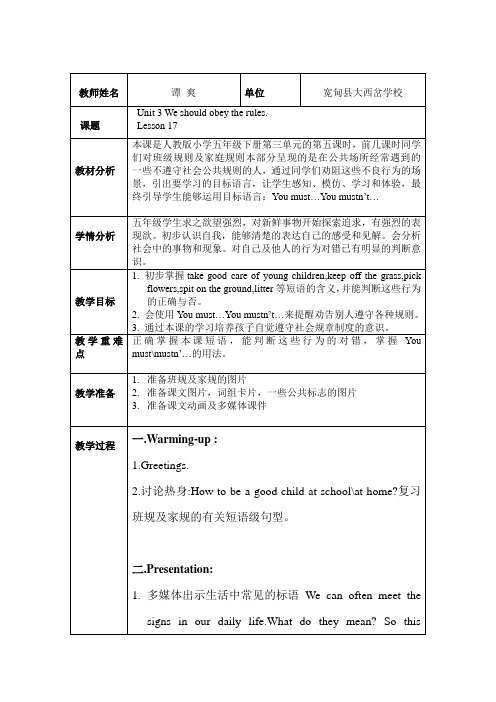
谭爽ቤተ መጻሕፍቲ ባይዱ
单位
宽甸县大西岔学校
课题
Unit 3 We should obey the rules.
Lesson 17
教材分析
本课是人教版小学五年级下册第三单元的第五课时,前几课时同学们对班级规则及家庭规则本部分呈现的是在公共场所经常遇到的一些不遵守社会公共规则的人,通过同学们劝阻这些不良行为的场景,引出要学习的目标语言,让学生感知、模仿、学习和体验,最终引导学生能够运用目标语言:You must…You mustn’t…
从整节课来看,教学时间合理的不够安排,学生没有充分练习课堂所学内容,没有能够很好的利用充分的想象力创设情境讲的大量的英语。如果能够给学生更多参与的机会,让学生有更多的时间操练,课堂效果会好一些,能够出现教学亮点。
3.出示课文图片,引导学生观察讨论
T:Who are they?Where are they? Yes.Li Yan,Kate and their friends are having a social study on the street.And what do they meet on the street?Let’s listen.
2.会使用You must…You mustn’t…来提醒劝告别人遵守各种规则。
3.通过本课的学习培养孩子自觉遵守社会规章制度的意识。
教学重难点
正确掌握本课短语,能判断这些行为的对错,掌握You must\mustn’…的用法。
教学准备
1.准备班规及家规的图片
2.准备课文图片,词组卡片,一些公共标志的图片
2.师生谈论:How to be a good child in your social life?并借助多媒体图片学习短语:take good care ofyoung children,keep off the grass,wait for…pick flowers,spit on the ground,litter,cross the street.来帮助学生学习和理解相应短语的含义,并在此过程中渗透You must…You mustn’t…的用法。
小学英语五年级【冀教版】上册教学课件-【Lesson 17 】

Grammar We are going to travel by train. 我们打算乘火车去旅行。
定义 be going to结构是将来时态的另一种形式, to后面接动词原形,用来表示按计划或者安排 要进行的动作或者事情。也可以用来表示推测 或者表示将来肯定要发生的动作,在句子中一 般译为“准备,打算”。
冀教版·五年级上册
Unit 3 A Travel Plan Lesson 17
The Travel Plan
A plane is fast. A bus is slow. Let’s take a plane. That is how I want to go! A plane is not cheap. A train is just right! We can take a train. On our trip to Beijing!
On T__h_u_r_s_d_a_y, we will go to __th_e__G_r_e_a_t_W__a_l_l ___.
On __F__r_i_d_a_y__, we will _____g__o_s_h__o_p_p. ing
On S_a_t_u_r_d_a_y_, we will __g_o__h_o_m_e__.
星期二 星期三
星期四
What day is today?
February
1 2 3 456 78 9 10 11 12 13 14 15 16 17 18 19 20 21 22 23 24 25 26 27 28
星期五 星期六
4 what places to visit 5 when to go home
五年英语 Lesson 17
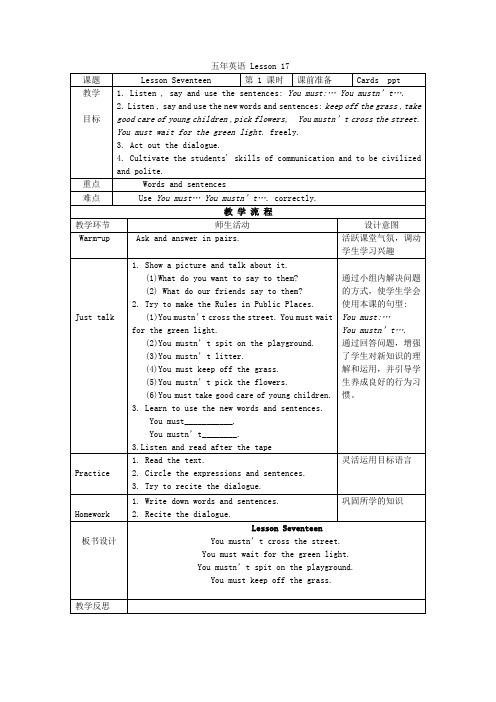
(5)You mustn’t pick the flowers.
(6)You must take good care of young children.
3. Learn to use the new words and sentences.
2. Try to make the Rules in Public Places.
(1)You mustn’t cross the street. You must wait for the green light.
(2)You mustn’t spit on the playground.
(3)You mustn’t litter.
教 学 流 程
教学环节
师生活动
设计意图
Warm-up
Ask and answer in pairs.
活跃课堂气氛,调动学生学习兴趣
Just talk
1. Show a picture and talk about it.
(1)What do you want to say to them?
(2) What do our friends say to them?
You must___________.
You mustn’t________.
3.Listen and read after the tape
通过小组内解决问题的方式,使学生学会使用本课的句型:
You must:…
You mustn’t….
通过回答问题,增强了学生对新知识的理解和运用,并引导学生养成良好的行为习惯。
教学反思
Practice
- 1、下载文档前请自行甄别文档内容的完整性,平台不提供额外的编辑、内容补充、找答案等附加服务。
- 2、"仅部分预览"的文档,不可在线预览部分如存在完整性等问题,可反馈申请退款(可完整预览的文档不适用该条件!)。
- 3、如文档侵犯您的权益,请联系客服反馈,我们会尽快为您处理(人工客服工作时间:9:00-18:30)。
Lesson 18
Part 1 IQ questions
a. Now three boys are on a bus. A speaks Chinese and Japanese. B speaks English and Chinese. C can only talk with A. What language does C speak? C can speak ________.
b. Jack was a very poor boy, but now he is very rich. Every dog has its day. Can you guess the meaning of the underlined sentence?
___________________________________________________________________________
c. The letters in the puzzle stands for the numbers 0—5. Can you work it out?
A C D
B C
+ C E D B D
F B A D C
Part 2:Fun Reading:
Kelly: Peter, I swallowed an orange-pit.
Peter: Don’t drink water anyway. When the seed gets water, it will sprout and grow. If you drink water, an orange tree will grow up through your head.
Part 3: Reading
First listen and then answer the question.
What two interruptions did the writer have?
After breakfast, I sent the children to school and then I went to the
shops. It was still early when I returned home. The children were at
school. My husband was at work and the house was quiet. So I decided
to make some meat pies. In a short time I was busy mixing butter and
flour and my hands were soon covered with sticky pastry. At exactly that
moment, the telephone rang. Nothing could have been more annoying. I
picked up the receiver between two sticky fingers and was dismayed when I recognized the voice of Helen Bates. It took me ten minutes to persuade her to ring back later. At last I hung up the receiver. What a mess! .There was pastry on my fingers, on the telephone, and on the doorknobs. I had no sooner got back to the kitchen that the doorbell rang loud enough to wake the dead. This time it was the postman and he wanted me to sign for a registered letter.
New words and expressions.
sticky /'stiki/ adj. dismay /dis’meI/ v.
finger /'fiŋgə / n. recognize /'rekəgnaIz/ v.
pie /pai/ n. persuade /pə'sweid/ v.
mix /miks/ v. mess /mes/ n.
pastry /'peistri/ n. doorknob /'dɔ:nɑb/ n.
annoying /ə'nɔI-Iŋ/ adj. sign /sain/ v.
receiver /ri'si:və/ n. register /'reʤIstə/ v.
interruption n.
Question:
1. When did the writer send the children to school?
.
2. What did the writer do after then?
.
3. Was the writer’s husband at home?
.
4. What did the writer decide to do?
.
5. Who telephoned then?
.
6. Was the doorbell rang loud or quiet?
.
Part 4:Pattern Tranformation
1. Caroline often goes to school by bus. (就画线部分提问)
_________ does Caroline often _________ to school?
2. Do it quickly. (改为否定句)
________ _________ it quickly.
3. Shirley spends a lot of time at weekends watching TV.(改为一般疑问句)
______ Shirley _______ a lot of time at weekends watching TV?
4. It will take Leo about fifty minutes to get there. (就画线部分提问)
_________ _________ will it take Leo to get there?
5. It is a nice watch.(改为感叹句)
_________ a _________ watch it is!
6. What's wrong with Judy?
________ the _________ with Judy?
7. Why don't we go to the seaside? It's very beautiful.
_________ _________ go to the seaside? It's very beautiful.
8. Book B is easier than Book A.
Book A is _________ _________ than Book B.
9. How do you like Chinese food, Jenny?
________ do you _________ of Chinese food, Jenny?
10. Mr Edison usually takes a train to work.
Mr Edison usually _________ to work _________ train.
Part 6:Open Your Mouth
(1)A snow year, a rich year.
A good medicine tastes bitter.
Birds of a feather flock togethe r
1. How many hours of TV do you watch each week?
2. Do you think you watch too much TV? Why or why not?
3. What kinds of TV shows do you most like and dislike?
4.Do you think watch TV is good or bad? Give your reasons.
YOUR HOMEWORK.
Do you know the Chinese names of the following movies?
◆King Kong ____________ ◆Harry Potter ___________
◆Star war ____________ ◆Titanic ____________
◆Spider Man ____________ ◆Shrek ____________
◆The Lion King ____________ ◆Pirates of the Caribbean ____________
◆The Banquet ____________ ◆Curse of the Golden Flower _____________。
